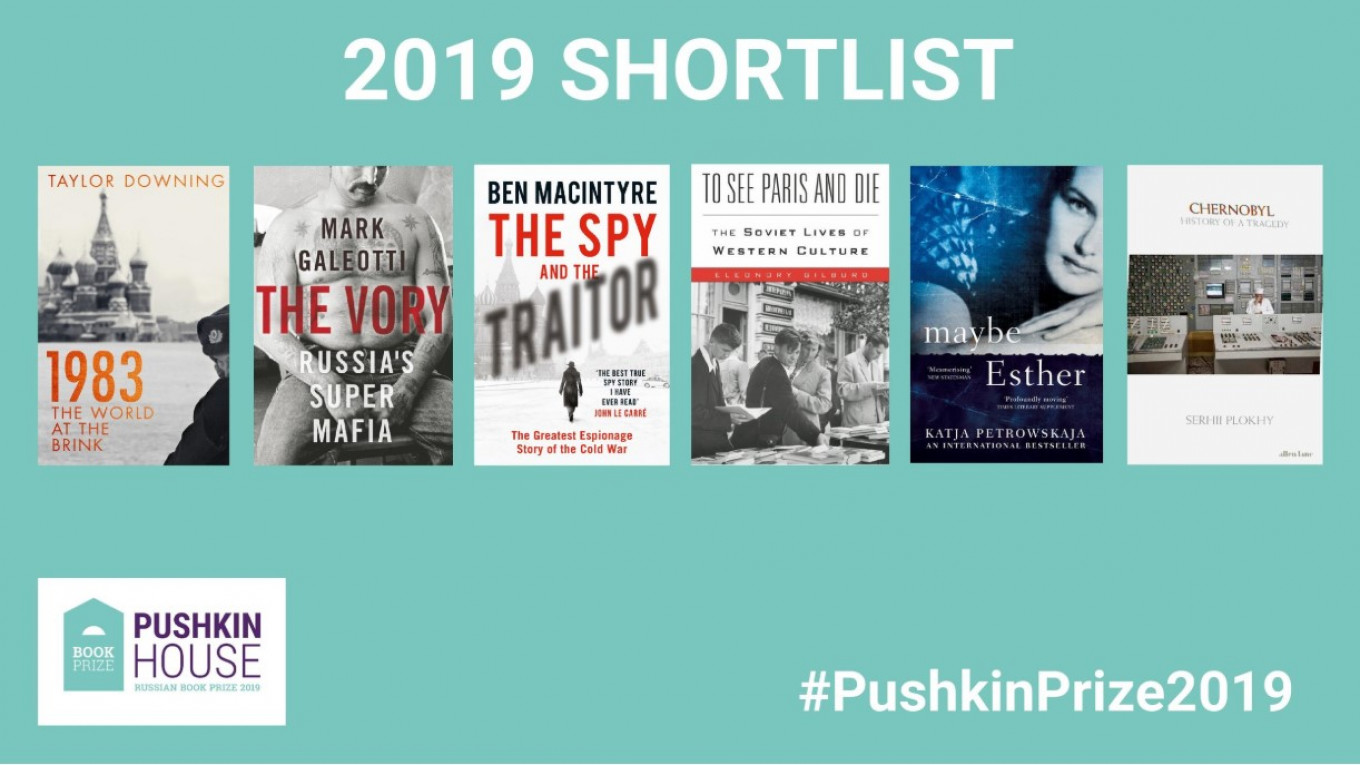In Moscow on Thursday, the short list for the 2019 Pushkin House Book Prize was announced by Alexander Drozdov, executive director of the Yeltsin Presidential Center and a member of this year’s jury.
The Prize has been awarded annually since 2013 to the best book of non-fiction about Russia or the Russian-speaking world written for the general reader in English — or translated into English — and published during the previous year.
The jury members spent the last four months making their way through more than 50 books before meeting to discuss and make the final cut to six finalists. This year they are:
- “1983: The World at The Brink” by Taylor Downing (Little, Brown)
- “The Vory: Russia’s Super Mafia” by Mark Galeotti (Yale University Press)
- “To See Paris and Die: The Soviet Lives of Western Culture” by Eleonory Gilburd (Belknap Press at Harvard University Press)
- “The Spy and the Traitor” by Ben Macintyre (Viking)
- “Maybe Esther” by Katja Petrowskaja, translated from German by Shelley Frisch (4th Estate)
- “Chernobyl: History of a Tragedy” by Serhii Plokhy (Allen Lane)
The jury, chaired this year by Sergei Guriev, chief economist at the European Bank for Reconstruction and Development and professor of economics at Sciences Po Paris, also included Drozdov; Rachel Campbell-Johnston, chief art critic at The Times; Andrei Zorin, professor of Russian at Oxford University and fellow of New College; and by tradition, the winner of last year’s book award, Alexis Peri, assistant professor at Boston University.
In London, Sergei Guriev said that they'd put together a list of "six books which are not only informative and relevant but are also a joy to read. They are very diverse and representative of over 50 excellent eligible submissions, including books on history, culture, espionage, Cold War and recent political developments. I am looking forward to more fierce discussions to select the overall winner.”
At the announcement ceremony, Drozdov noted that the Yeltsin Center participation in this year’s prize is a “continuation of our work in culture, both Russian-language and with foreign partners.” The Yeltsin Center will support a translation into Russian of one of the books this year. He also noted that although this year’s books vary greatly in genre, from the thriller of “The Spy and the Traitor” to the memoir of “Maybe Esther,” they happen to all concern events and stories from the second half of the 20th century.
The jury members will spend the six weeks reading and considering the finalists before announcing the winner at a dinner held at the Charterhouse in London on June 12. The author of the winning book will receive a prize of £5,000.
The Book Prize was established to encourage public understanding and intelligent debate about the Russian-speaking world and has become one of the most popular events at Pushkin House. It is made possible thanks to contributions from Douglas Smith and Stephanie Ellis-Smith, The Polonsky Foundation, and this year, the London Russian Book Club.
The Pushkin House, an independent charitable trust, was founded in 1954 to be a home for Russian culture in London. It holds a wide variety of activities, including lectures, master classes, films, concerts, talks, and exhibitions on an enormous range of subjects connected with Russian culture and history, as well as Anglo-Russian relations.
A Message from The Moscow Times:
Dear readers,
We are facing unprecedented challenges. Russia's Prosecutor General's Office has designated The Moscow Times as an "undesirable" organization, criminalizing our work and putting our staff at risk of prosecution. This follows our earlier unjust labeling as a "foreign agent."
These actions are direct attempts to silence independent journalism in Russia. The authorities claim our work "discredits the decisions of the Russian leadership." We see things differently: we strive to provide accurate, unbiased reporting on Russia.
We, the journalists of The Moscow Times, refuse to be silenced. But to continue our work, we need your help.
Your support, no matter how small, makes a world of difference. If you can, please support us monthly starting from just $2. It's quick to set up, and every contribution makes a significant impact.
By supporting The Moscow Times, you're defending open, independent journalism in the face of repression. Thank you for standing with us.
Remind me later.







